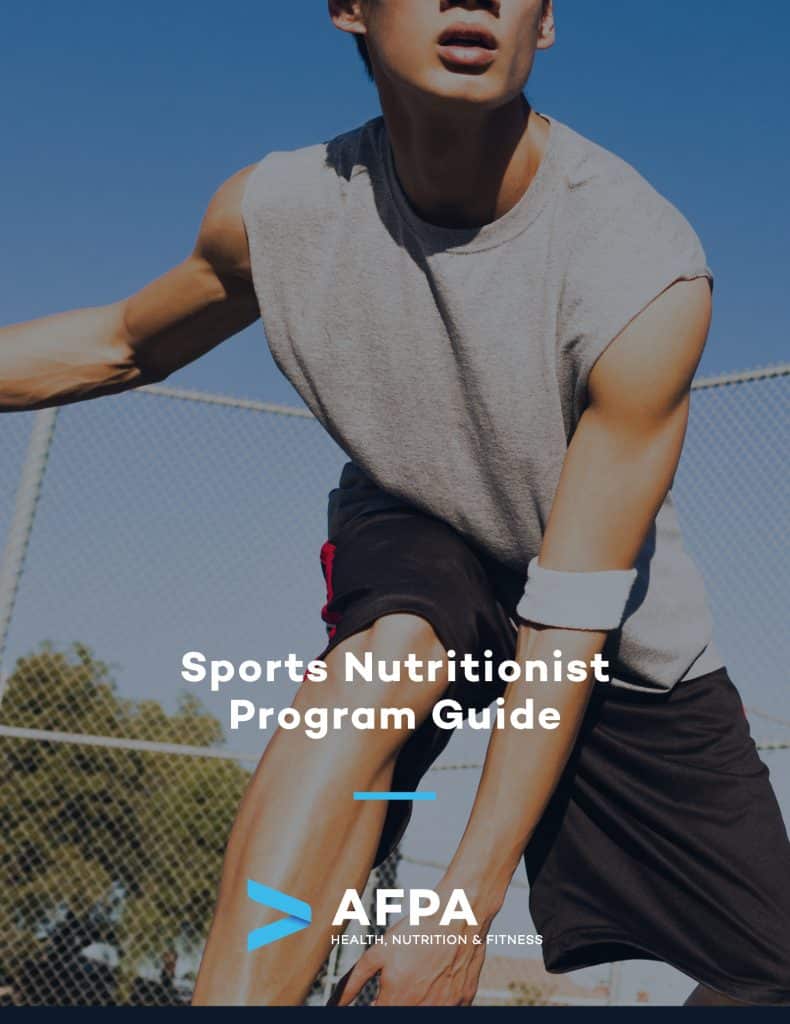Bulking is a term commonly used in bodybuilding that refers to a progressive increase in calorie consumption beyond your body’s base needs, in combination with an increase in the intensity of weight training.
Most people who implement bulking strategies practice bodybuilding as a sport or a hobby. Bodybuilding activities aim to build musculature while reducing fat mass to gain definition. The strategies for achieving improvements in physique from a bodybuilding standpoint focus on exercise and diet.
Thus, the goal of bulking is to gain muscle mass at an accelerated pace through modification in diet combined with exercise.
However, since bodybuilding bulking is not an exact science, there are many myths around bulking that can lead people to take on unhealthy practices. Here, we look at the evidence to dispel eight bulking myths.

Learn How to Fast-Track Your Career as a Sports Nutritionist

The Phases of Bodybuilding
Bulking is just one phase of bodybuilding. While programs can differ slightly, the three main phases of bodybuilding are bulking first, then cutting, and then maintenance.
The first phase of bodybuilding, as described above, is the bulking phase focused on muscle gain through increased calorie consumption and intense weight training.
The second phase of bodybuilding is cutting, which is a gradual decrease in calorie intake and an increase in aerobic resistance training to lose fat, retain muscle mass, and achieve greater muscle definition. Since bulking can result in increased fat storage in addition to muscle building, cutting, when done correctly, helps bodybuilders shed fat to reveal the muscle mass gained in the bulking phase.
The calorie intake between the bulking and cutting phase differs significantly. Researchers found that, on average, men who were bodybuilders consumed about 3,800 calories a day and women who were bodybuilders consumed about 3,200 calories a day. In the cutting phase, men reduced their calorie intake to 2,400 calories daily and women reduced their intake to 1,200 calories, respectively. In general, the calories are distributed in protein intakes higher than standard recommendations, and carbohydrate intakes lower than standard recommendations.
8 Busted Myths About Bulking
Myth #1: Bulking on its own helps people gain muscle
Bulking is a dietary choice a bodybuilder makes to eat more calories than they need for their current body weight and activity level.
However, in order for bulking to result in muscle gain, increased calorie consumption must be paired with resistance exercise. If consuming excess calories is not paired with resistance exercise, you will likely gain weight in the form of fat.
Myth #2: Bulking helps people lose fat
In the bulking stage, people consume significantly more calories than they need while performing intense muscle-building resistance exercises. The goal of the bulking stage is not to lose fat, but rather to gain muscle.
Fat loss is generally prioritized in the stage that follows bulking, known as cutting.
Myth #3: Bulking helps people gain muscle definition in the short term
Bulking is only one phase of the bodybuilding process. The goal is to gain muscle mass but not muscle definition. It is the cutting stage, where calories are gradually restricted while continuing to perform resistance exercise, where bodybuilders begin to see muscle definition.
While there is no standard cycle length, studies show that bulking stages usually begin at about six months before the competition or goal date, so the end goal cannot be safely met in the short term.
Myth #4: It doesn’t matter what you eat as long as you eat enough calories
Not all calories are equal. Ultra-processed foods, for example, are high in calories in the form of refined carbohydrates and saturated fats. A diet composed largely of ultraprocessed foods can lead to a range of health issues, including heart disease and cancer, even when it is paired with exercise.
Additionally, research shows that, in the bodybuilding context, eating a diet rich in processed foods may make it difficult to lose fat and retain muscle.
Myth #5: You need to get your extra calories from protein
Many athletes in the bulking stage tend to get their extra calories from protein with the belief that an increase in protein consumption is required for muscle building. While protein needs do increase when you are building muscle, so do fat and carbohydrate needs. In fact, carbohydrate consumption can help aid in recovery after exercise.
Myth #6: You need to eat frequent meals to bulk
There are many ways to ensure you are consuming enough calories during the bulking stage and taking advantage of the benefits of eating frequent meals that don’t involve spending hours at the table.
Other ways to meet calorie needs without sitting down to snack and eat meals is by consuming high-calorie drinks in between meals or ready-to-eat supplements.
Myth #7: You need to take supplements to meet requirements during bulking
Bodybuilders can meet their nutrient needs consuming only whole foods. In fact, consuming whole foods can help to ensure they are meeting micronutrient needs in addition to macronutrient needs. High-calorie, nutrient-dense whole foods like fatty fish, whole grains and minimally-processed oils are all options to help you meet your energy requirements without supplements.
However, when people are having trouble meeting their macronutrient requirements due to a lack of time, access, or an inability to eat more food, supplements can help. If individuals are consistently falling short of calorie needs or protein requirements, or are unable to consume foods with amino acids that are beneficial for muscle gain, supplements can help to support their athletic process.
Myth #8: Everyone can increase muscle mass by following the same bulking pattern
There is no proven method for maximizing muscle gain in all individuals. The Journal for the International Society of Sports demonstrates that all individuals respond differently to changes in macronutrient distribution, an increase caloric intake, and other methods for increasing muscle mass or improving definition. For this reason, it is important to evaluate your body’s individual response with the guidance of a sports nutritionist or similar professional.
Learn How to Fast-Track Your Career as a Sports Nutritionist




